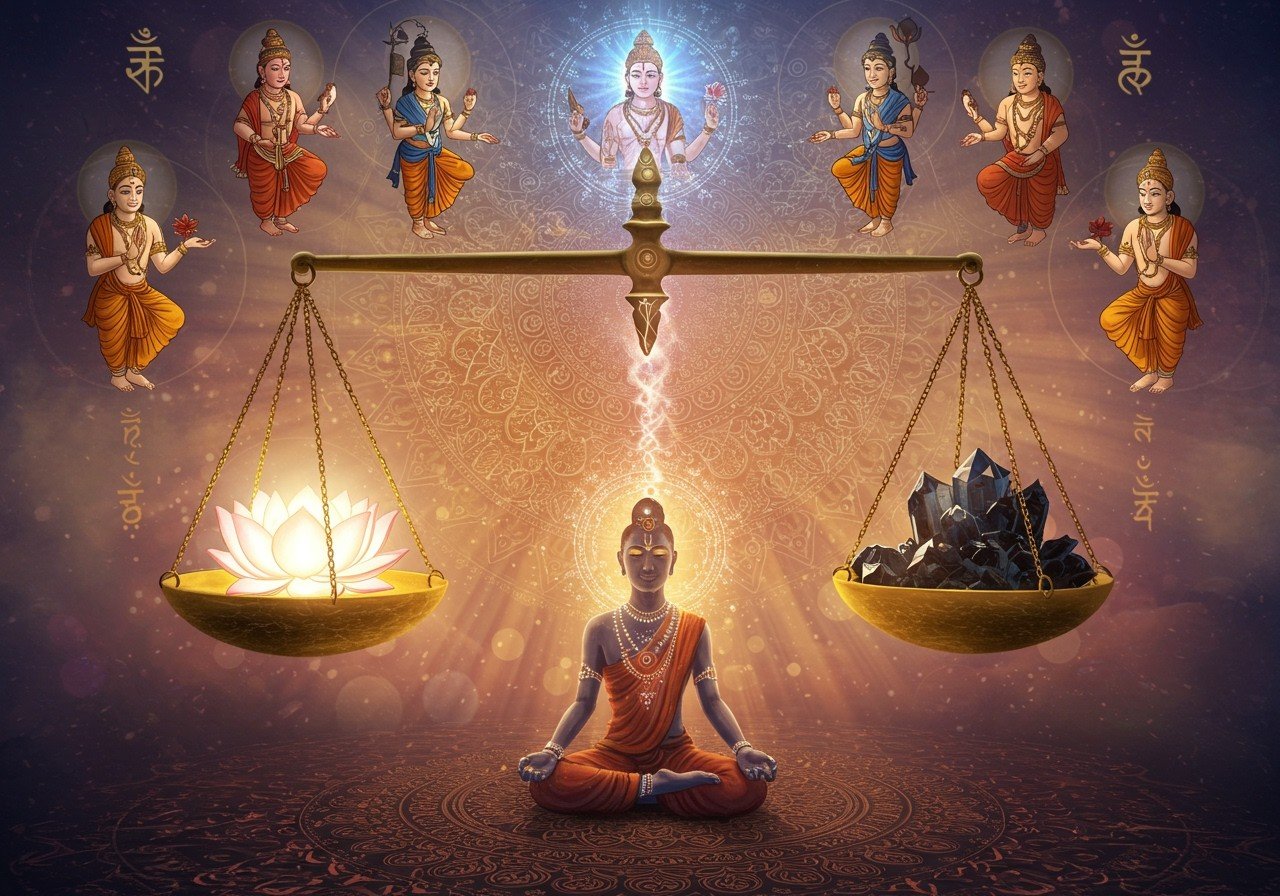
Karma and justice are integral concepts in Indian philosophy and spirituality, influencing our daily lives, actions, beliefs, and understanding of fairness. They offer a framework for ethical living and contribute to a more balanced and harmonious existence. Let’s delve deeper into these interconnected principles.
Understanding Karma
Karma, often simplified as “what goes around comes around,” is a principle of cause and effect. It suggests that our intentions and actions, whether positive or negative, shape our future experiences. This principle emphasizes personal responsibility, holding us accountable for our choices. Explore the law of karma in Hinduism further on poojn.in.
- Definition: Karma is more than a simple system of rewards and punishments. It’s a guiding energy created by our deliberate actions and intentions. It emphasizes the importance of mindfulness in our thoughts, words, and deeds. Every action generates energy that returns to us in some form, influencing our present and future.
- How it works: Karma influences our lives in various ways. For those who believe in it, practicing good deeds can foster stronger friendships, inner peace, and overall happiness. Even for those who don’t subscribe to the philosophy of karma, treating others poorly often leads to negative feelings, strained relationships, and unhappiness. Every action has a reaction, creating ripples that extend beyond our immediate perception.
- Types of Karma: Karma can be categorized into individual and collective forms. Individual karma arises from our personal thoughts, words, and actions, directly affecting our individual experiences. Collective karma, on the other hand, is generated when people act as a group, impacting the shared experiences of a community, nation, or even the world.
- Karma in Daily Life: Karma can influence how we live, either with fear of repercussions or with anticipation of future rewards. Cultivating good karma involves practicing kindness, compassion, and good deeds. Examples include helping those in need, being present for loved ones, expressing gratitude, and showing respect for all beings.
- Karma vs. Fate: It’s important to distinguish karma from fate. Fate implies a predetermined path, while karma emphasizes the power we have to shape our future through our choices. Karma is a dynamic force, not a static decree.
- The 12 Laws of Karma: These laws provide a framework for ethical living, encouraging mindful actions and intentions. They include the Great Law (cause and effect), the Law of Creation (participation in life creation), the Law of Humility (acceptance of current reality), the Law of Growth (changing oneself internally), the Law of Responsibility (taking ownership of our lives), the Law of Connection (past, present, and future are linked), the Law of Focus (concentration on one thing at a time), the Law of Giving and Hospitality (demonstrating selfless service), the Law of Here and Now (present moment awareness), the Law of Change (history repeats until lessons are learned), the Law of Patience and Reward (meaningful rewards require effort), and the Law of Significance and Inspiration (contributions matter, even small ones). These laws offer a roadmap for living a more conscious and fulfilling life. Consider acquiring a pure cotton dhoti from poojn.in for your spiritual practices.
Exploring Justice
Justice is a fundamental social value that centers on fairness and equitable treatment. It’s the cornerstone of a just and harmonious society. Learn more about dharma and its relationship to justice on poojn.in.
- Definition: Justice involves upholding what is right, ensuring that everyone receives fair and impartial treatment. The core principle of justice is treating equals equally and unequals unequally, in proportion to their relevant differences.
- Justice in Daily Life: Practicing justice involves honesty, respect, and standing up for what’s right. It also means refraining from harming others and striving to make their lives easier whenever possible. Small acts of kindness and consideration can contribute to a more just and compassionate world.
- Social Justice: Social justice addresses fairness within a society, particularly regarding the distribution of wealth, opportunities, and basic needs. It seeks to eliminate inequalities related to gender, race, religion, and other factors, ensuring that everyone has access to essential resources like food, shelter, healthcare, and education, and is protected from discrimination. Explore the pantheon of Hindu gods and goddesses on poojn.in, many of whom embody aspects of justice.
- Justice and Development: Justice plays a vital role in societal development, contributing to the eradication of poverty and hunger, promoting gender equality, and ensuring environmental sustainability. Access to justice programs empowers marginalized communities, strengthens security, and provides support for victims of injustice. Consider a brass Lakshmi murti from poojn.in to invite prosperity and justice into your home.
- Injustice in Everyday Life: Despite our best intentions, injustice remains a pervasive issue. Social injustices and oppression can be insidious forms of violence, significantly impacting mental health and overall well-being. Recognizing and addressing these injustices is crucial for creating a more equitable society. Explore the divine feminine power on poojn.in, which often represents justice and protection.
- Restorative Justice: Restorative justice focuses on repairing harm and addressing the needs of victims and communities. It involves open dialogue, understanding the impact of harmful behavior, and finding ways to make amends. This approach seeks to heal and restore balance rather than simply punish. Embrace the principles of restorative justice by fostering understanding and compassion in your interactions.
Intertwined Principles
Karma and justice are interconnected concepts that promote balance and harmony. While karma focuses on individual actions and consequences, justice addresses the broader societal framework for fairness and equitable treatment. By understanding and integrating these principles into our lives, we can strive towards a more just and compassionate world. Poojn.in offers resources and products to support your journey towards spiritual growth and understanding of these essential principles. Explore our collection of puja items, sacred texts, and more to enhance your practice and deepen your understanding.


